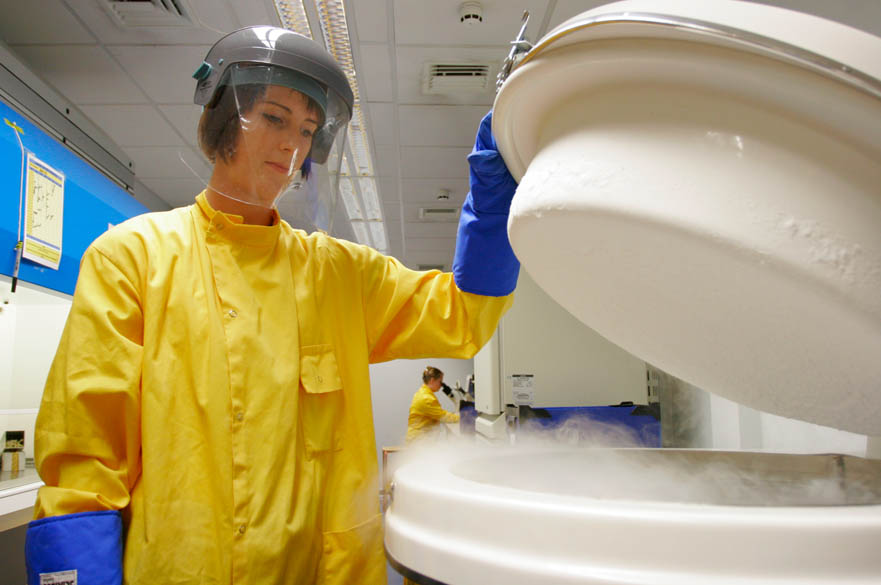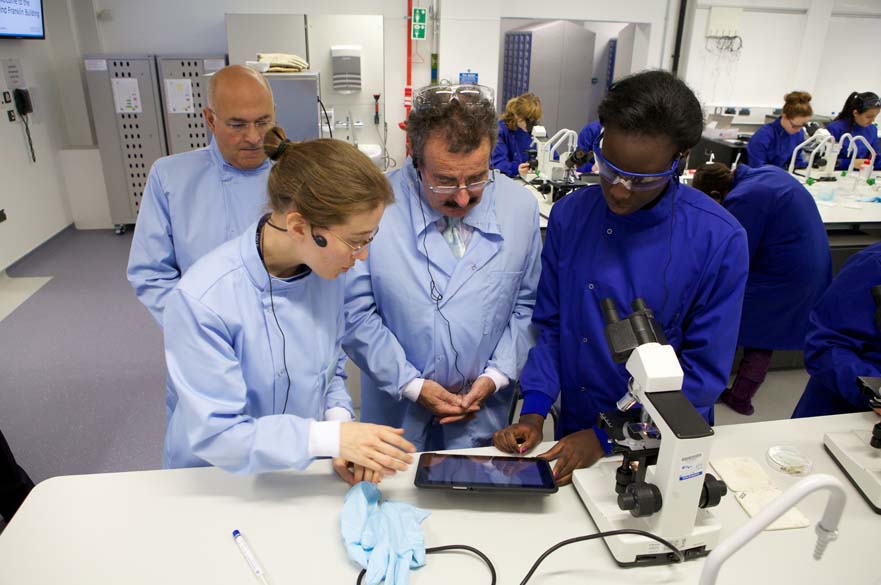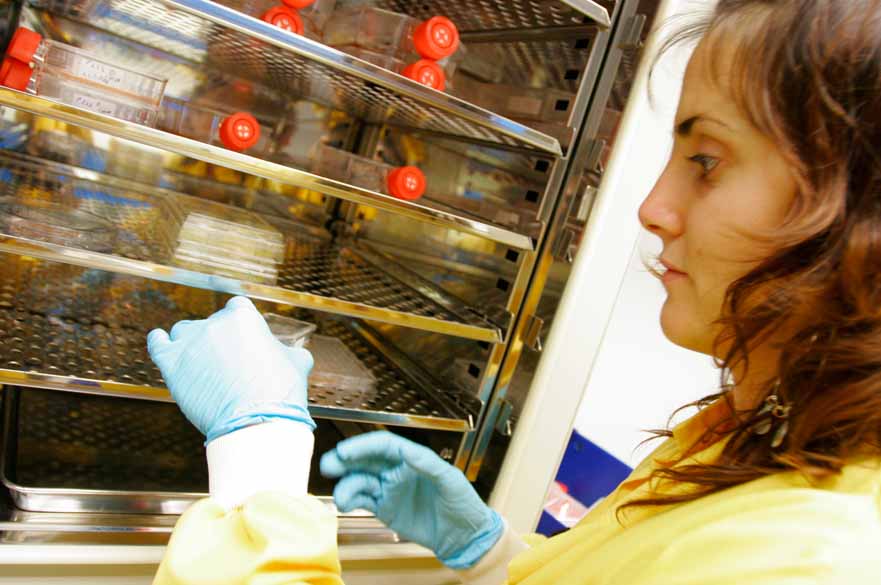Biotechnology MSc
About this course
This exciting biotechnology postgraduate degree is designed to give you the theoretical and practical skills needed for a career in Biotechnology within companies and research organisations.
Biotechnology is a key international growth area and this course is driven by the latest commercial and research advances in the field. Students have the opportunity to learn from experienced academic researchers with the possibility of undertaking a research project in industry.
This course is ideal if you:
- are a recently qualified undergraduate and are looking for the professional skills needed to obtain a job in a Biotechnology company
- are working in an organisation and want a masters-level qualification to give you a competitive edge
- require the skills and experience needed to study for a research degree
- are an international student who would like to study abroad
- would like a course delivered by experienced research academics, with the possibility of completing a research project in industry
- want to use cutting-edge facilities to develop your own learning and research.
-
If you choose the Sandwich-route, you will be given the opportunity to do a work placement to develop your professional experience.
-
In the last Research Excellence Framework (REF 2021) - the UK's system for assessing the quality and impact of research in universities - we’re proud that 99% of NTU’s Allied Health Professions, Dentistry, Nursing and Pharmacy submission was assessed to be world-leading or internationally excellent.
What you’ll study
The course is completed with a five-month laboratory based research project. You may carry out the work either in the School or in another academic or industrial research laboratory in the UK or abroad, subject to approval by the Course Team.
During this course you will study six core modules as well as undertaking a research project. You will also choose from two optional modules.
Core modules:
Molecular Biology (20 cp)
During this module, you'll consolidate your knowledge of the molecular biology of prokaryotes and eukaryotes, and how to prove hoe genomes are mutated, analysed and manipulated in the detection, study and therapy of disease. You'll study the control of gene expression in prokaryotes and eukaryotes, and the control at transcriptional, post-transcriptional (RNAi, microRNA) and translational levels.
Cell Culture and Antibody Technology (20 cp)
You'll explore the scientific basis of cell culture and antibody technologies, and assess how they're used to solve problems in biotechnology, molecular biosciences, and biomedical sciences. You'll look at the relationship between cell and antibody technologies, as well as other technologies, particularly recombinant DNA technology and how these may develop in the future.
Special Topics in Biotechnology (20 cp)
You'll study the molecular basis of the approaches used in plant and yeast biotechnology. This knowledge will be used to explore how problems in biotechnology can be solved. In addition, you'll discover the environmental implications that come with using biotechnology. This eLearning module is supported by on-campus workshops.
Business and Enterprise (20 cp)
You'll approach ideas generation in a creative manner to understand the role of new business concepts, and their development in the biosciences industry. You'll explore all aspects of starting up a new biosciences company, including new product development, marketing and research, pricing, distribution, and promotion.
Research Methods and Bioethics (20 cp)
This module encourages you to think beyond your own subject, and interact accordingly. You'll gain a solid foundation in literature review, research design and planning, data analysis and a poster presentation by focusing your studies on a related ethical issue. Ethical issues in research will also be explored, as you discover when and how to obtain ethical clearance in accordance with ethical governance at NTU.
Research Project (60 cp)
In consultation with a supervisor at NTU, you'll select a research topic comprising an original, defined research question (or series of such questions), and develop a written research proposal for the Project. You'll then present this proposal as part of the Research Methods and Bioethics module.
Optional modules:
Microbial Diagnostics (20 cp)
This module aims to provide you with an understanding of the rationale and process of designing modern microbial diagnostic assays. Furthermore, you'll explore the theory and rationale of techniques such as culture-based diagnosis, serology, PCR, real-time PCR, microarrays, and sequencing for infectious disease diagnostics. You'll gain practical experience of performing real-time PCR detection from a sample.
Techniques in Macromolecular Analysis (20 cp)
The aims of this module are to provide an advanced knowledge and understanding of the techniques that can be used to isolate and purify macromolecules, and the approaches that can be used to track, study and predict macromolecular structure and function. You'll explore a range of current topics, and their application to macromolecular analysis. These topics will include the macromolecular analysis of proteins, protein purification programs and simulations, and protein bioinformatics.
Alongside your study you also have the opportunity to learn a new language. The University Language Programme (ULP) is available to all students and gives you the option of learning a totally new language or improving the skills you already have. Find out more about the ULP.
We regularly review and update our course content based on student and employer feedback, ensuring that all of our courses remain current and relevant. This may result in changes to module content or module availability in future years.
How you're taught
Modules assessed by a variety of different types of course work including written assignments, oral presentations and poster presentations, and examinations. The Research Project will involve the design, implementation and reporting of a major research task.
Study hours
Contact hours for a 20 cp modules are typically around 50 hours, with a further 150 hours expected from you for directed and independent study.
Research informed teaching
By daring to think differently our research is tackling real-world issues. The subjects you will study with us are informed by our research so you can be sure your knowledge will be cutting-edge in your field. In the last Research Excellence Framework (REF 2021) - the UK's system for assessing the quality and impact of research in universities - we’re proud that 99% of NTU’s Allied Health Professions, Dentistry, Nursing and Pharmacy submission was assessed to be world-leading or internationally excellent.
How you're assessed
Coursework (86%) and written (14%)
Contact hours
Lectures/seminars/workshops (20%) and independent study (80%)
Careers and employability
This Biotechnology Masters degree provides students with the professional skills, experience and knowledge necessary to pursue a wide range of careers within the field of biotechnology, alongside valuable transferable skills. Students would also be well-placed to study for a PhD.
Placements
NTU is one of the most employment-focused universities. Increasingly, employers want to recruit graduates who have real-world work experience. That’s why all of our courses, across every subject area, offer you a work experience opportunity. Our experts help build and support your future with a range of career programmes and events.
The school of Science and Technology will work closely with you to help find a placement and strengthen your CV and interview techniques. You'll be supported and assessed throughout your placement year and will write a reflective report and diary at the end of your placement. When you successfully complete your placement and submit your placement report, you will be eligible to receive an additional award of a Postgraduate Diploma in Professional Practice.
Please note that placements are not guaranteed and the process is competitive through an application and interview process.
If you take the sandwich route, and start this course in September / October you will complete your placement following your taught modules and research project. If you start in January you will complete one term of taught modules and your project, then go on placement before returning to NTU for your final term of modules.
Our recent students have taken placements across a wide range of companies including the NHS, Pfizer and Public Health England. They secured varied roles such as Trainee Biomedical Scientists (Immunology), Biomedical Science Assistant and Volunteer Mentor.
Re:search Re:imagined
To us, research is about more than writing papers and proposing new ideas. By daring to think differently, we’re disrupting the research landscape and finding the answers to the questions that really matter. From conservation management to sustainable farming, we’re inspiring the brightest minds to rise up and find solutions to some of the most significant global challenges facing society.
NTU Enterprise
You'll also have the opportunity to turn your ideas into a viable business with help from NTU Enterprise, NTU's purpose-built Centre for Entrepreneurship and Enterprise, a support centre to help students create, develop and grow their own businesses.
Campus and facilities
You’ll mainly be studying in the Interdisciplinary Science and Technology Centre (ISTeC) and Rosalind Franklin Buildings with access to facilities including our extensive SuperLab, with space for almost 200 students.
Our self-contained, community-focused Clifton Campus has been designed to keep students busy between lectures. Catch-up with your coursemates in the Pavilion’s barista café and Refectory; brainstorm group presentations in chic and stylish study spaces; enjoy some proper R&R in The Point, home of our Students’ Union. The campus also hosts the multimillion-pound Clifton Sports Hub, offering great options for everyone — whatever your interests, and however competitive you’d like to get!
You’re also right next to the bright lights of Nottingham — one of Britain’s top 10 student cities, and one of Europe’s top 25. All through termtime, a dedicated on-campus bus service will get you to the heart of the action (and back) in under 25 minutes. You’ll find a city stuffed with history, culture, and well-kept secrets to discover at your leisure: enjoy lush green spaces, galleries, hidden cinemas and vintage shopping by day, and an acclaimed food, drink and social scene by night.
Entry requirements
What are we looking for?
- A UK honours degree (minimum 2.2) or equivalent in a relevant discipline such as Biochemistry, Biology or Microbiology
- Applicants with relevant employment experience or other relevant qualifications will also be considered
NTU may admit a student with advanced standing beyond the beginning of a course, through an assessment of that student's prior learning, whether it is certificated or uncertificated. Our Recognition of Prior Learning and Credit Transfer Policy outlines the process and options available to these prospective students, such as recognising experiential learning or transferring to a similar course at another institution, otherwise known as credit transfer.
All prospective students who wish to apply via Recognition of Prior Learning should initially contact the central Admissions and Enquiries Team who will be able to support you through the process.
Getting in touch
If you need more help or information, get in touch through our enquiry form
You will need one of the following:
- A UK honours degree (minimum 2.2) or equivalent in a relevant discipline such as Biochemistry, Biology or Microbiology
International qualifications
We accept qualifications from all over the world – check yours here:
Postgraduate preparation courses (Pre-Masters)
If you don’t yet meet our entry requirements, we offer Pre-Masters courses through our partner Nottingham Trent International College (NTIC), based on our City Campus:
English language entry requirements
You can meet our language requirements by successfully completing our pre-sessional English course for an agreed length of time, or by submitting the required grade in one of our accepted English language tests, such as IELTS:
Would you like some advice on your study plans?
Our international teams are highly experienced in answering queries from students all over the world. We also have members of staff based in Vietnam, China, India and Nigeria and work with a worldwide network of education counsellors.
- Complete this simple form to keep in touch with the International Office.
Fees and funding
The fees for September 2025 and January 2026 entry are:
| Study route | UK | International |
|---|---|---|
| Full-time | £9,990 | £20,250 |
| Full-time with placement year | £9,990 + £1,850 | £20,250 + £1,850 |
| Part-time | £4,995 | £10,125* |
*For part-time study please check your student visa regulations.
Please note that if you are considering a course that runs over more than one year, the tuition fee stated is for the first year of study. The course fee for the second year may be subject to annual review.
Funding your studies
Preparing for the financial side of student life is important, but there’s no need to feel anxious and confused about it. We hope that our fees and living costs page and our funding page will answer all your questions.
Scholarships
You might be able to get a scholarship to help fund your studies. We award scholarships to those students who can demonstrate excellent achievement, passion and dedication to their studies.
Alumni discount
We’re happy to be able to offer a 20% alumni discount to most current NTU students and recent NTU alumni. This discount is currently available for those starting an eligible postgraduate taught, postgraduate research or professional course.
Getting in touch
For more advice and guidance, you can contact our Student Financial Support Service on: +44 (0)115 848 2494. For scholarship help please contact us on: +44 (0)115 848 4460.
The fees for September 2025 and January 2026 entry are:
| Study route | UK | International |
|---|---|---|
| Full-time | £9,990 | £20,250 |
| Full-time with placement year | £9,990 + £1,850 | £20,250 + £1,850 |
| Part-time | £4,995 | £10,125* |
*For part-time study please check your student visa regulations.
Please note that if you are considering a course that runs over more than one year, the tuition fee stated is for the first year of study. The course fee for the second year may be subject to annual review.
Scholarships
We offer scholarships of up to 50% of your tuition fee. You can apply for your scholarship when you have an offer to study at NTU.
Living costs
Get advice on the cost of living as an international student in Nottingham and how to budget:
Paying fees
Find out about advanced payments, instalment plan options and how to make payments securely to the University:
Would you like some advice on your study plans?
Our international teams are highly experienced in answering queries from students all over the world. We also have members of staff based in Vietnam, China, India and Nigeria and work with a worldwide network of education counsellors.
- Complete this simple form to keep in touch with the International Office.
How to apply
Ready to join us? Then apply as soon as you can. Just click the Apply button at the top of the page and follow the instructions for applying. Make sure you check the entry requirements above carefully before you do.
If you are interested in joining us in September 2025, this course will be open for applications through the applicant portal from September 2024. Courses starting in January 2026 will be open for applications from July 2025.
You can get more information and advice about applying to NTU in our postgraduates' guide. Here you'll find advice about how to write a good personal statement and much more.
Writing your application
Be honest, thorough and persuasive in your application. Remember, we can only make a decision based on what you tell us. Make sure you include as much information as possible, including uploading evidence of results already achieved, as well as a personal statement.
Keeping up to date
After you’ve applied, we’ll be sending you important emails throughout the application process - so check your emails regularly, including your junk mail folder.
Getting in touch
If you need any more help or information, please contact us at Ask NTU or call on +44 (0)115 848 4200.
Apply online through our NTU applicant portal.
If you are interested in joining us in September 2025, this course will be open for applications through the applicant portal from September 2024. Courses starting in January 2026 will be open for applications from July 2025.
Application advice
Apply early so that you have enough time to prepare – processing times for Student visas can vary, for example. After you've applied, we'll be sending you important emails throughout the application process – so check your emails regularly, including your junk mail folder.
Writing your personal statement
Be honest, thorough, and persuasive – we can only make a decision about your application based on what you tell us:
Would you like some advice on your study plans?
Our international teams are highly experienced in answering queries from students all over the world. We also have members of staff based in Vietnam, China, India and Nigeria and work with a worldwide network of education counsellors.
- Complete this simple form to keep in touch with the International Office.
The University's commitment to delivering the educational services advertised







